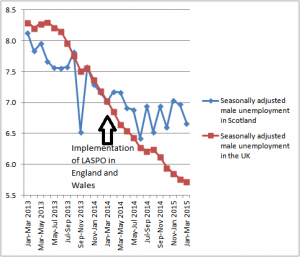In March 2014 the UK Government implemented new employment rights to people with criminal convictions by reducing the length of time until most convictions are deemed spent. These changes covered England and Wales only. The consultation to change this legislation was launched in Scotland on 20th May 2015.
Findings from Recruit With Conviction action research workshops show that disclosure of even minor criminal conviction can escalate anxiety in the mind of recruiters and this often leads to unfair and unreasonable de-selection. Similarly people with minor convictions often adopt avoidance behaviours when confronted with questions about criminal record disclosure and seek employment in situations where they are not asked, therefore diminishing their own opportunities for suitable employment.
By comparing unemployment trends between Scotland and the UK we hope to illustrate this point.

This graph which was created using data from ONS. It shows a clear trend of Scotland performing ahead of the UK for male unemployment until March 2014 and then lagging behind after Westminster reduced disclosure requirements in England and Wales. This is interesting because it is consistent with Recruit With Conviction findings. Men are 3 times more likely to have a criminal conviction than women and convictions correlate much more closely with unemployed people.
Reports (1) on 31 May 2015 show that Scotland has the lowest female unemployment rate in Europe.
Using big social data like this creates risks for bad social science because causality is rarely able to be defined in correlations. So while this graph neatly illustrates a point the qualitative evidence and the logic is more compelling. There are always many competing factors and the policies of targeting resources for female employment in Scotland is another likely contributing factor to the performance of men and women in the Scottish labour market.
It should be noted that while females with criminal convictions are less statistically significant, criminal conviction disclosure for woman is even more stigmatising and previous convictions have greater impact in the labour market for women individually.
(1) http://www.bbc.co.uk/news/uk-scotland-scotland-business-32950469